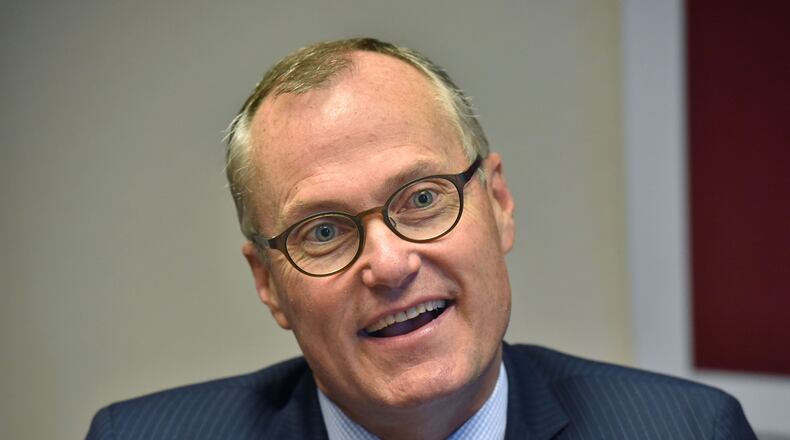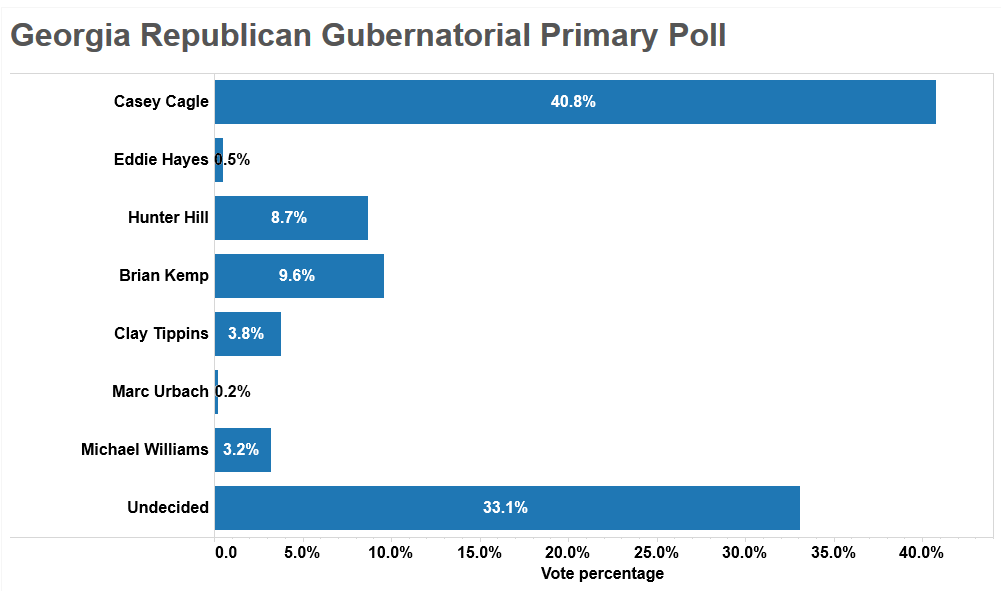Lt. Gov. Casey Cagle has a commanding lead over his Republican rivals in the race for governor, according to an Atlanta Journal-Constitution/Channel 2 Action News poll released Friday that showed an unsettled race for the No. 2 spot.
Cagle notched 41 percent of the vote among likely Republican voters, giving him an edge over his rivals but not enough support yet to avoid a July runoff. He’s followed by two candidates who hope to keep him under the 50-percent threshold: Secretary of State Brian Kemp notched 10 percent and ex-state Sen. Hunter Hill had 9 percent.
Two other candidates trailed the field: Executive Clay Tippins had about 4 percent of support, and state Sen. Michael Williams logged 3 percent.
But the poll showed there’s room to maneuver in the final weeks ahead of the May 22 vote. Roughly one-third of GOP primary voters are undecided — and some 40 percent of women still haven’t picked a candidate.
The poll shows the GOP race is more settled than the Democratic one. An AJC/Channel 2 survey released last week showed Stacey Abrams leading Stacey Evans 33 percent to 15 percent — with more than half of likely Democratic voters undecided.
In the lieutenant governor’s race, the poll shows no clear front-runner. State Sen. David Shafer led former state Rep. Geoff Duncan 14 percent to 12 percent, with ex-state Sen. Rick Jeffares trailing with 7 percent. About two-thirds of voters haven’t yet decided — including 3 in 4 women.
The poll was conducted April 19-26 by the University of Georgia’s School of Public and International Affairs, and each of the 507 respondents indicated he or she had voted in the 2014 or 2016 GOP primary and would likely vote in the May contest. The margin of error is 4.4 percentage points.
Leads across most demographics
Cagle, first elected statewide in 2006, is angling to get a majority of the vote in the primary to avoid a costly July runoff against the second-place finisher. He’s publicly said there’s little chance of landing a knockout blow, though his supporters believe he has an outside shot at surpassing the 50 percent mark needed.
His campaign has poured more than $4.5 million into a blitz of TV advertisements, and the results underscore his strong standing among core GOP voters. He led his opponents by double digits in just about every demographic. In most tallies, the other candidates tended to trail the counts for undecided.
Most of the other contenders have tried to gain ground by painting Cagle as an ineffective, mainstream politician and taken positions on abortion, gun rights and taxes to outflank him to his right. But the poll shows none has emerged as his leading rival.
Kemp, a two-term secretary of state, has vowed more aggressive crackdowns on illegal immigration and promised to outdo Mississippi’s toughest-in-the-nation abortion restrictions. He fared best with independent voters, capturing about one-quarter of those votes.
And Hill has tried to carve out a lane as an outsider with a pledge to significantly cut state spending and eliminate the state income tax. But he’s faced withering attacks from other contenders over comments he has disavowed calling for raising the minimum age to buy some guns from 18 to 21.
The other two candidates have struggled mightily to gain traction. Tippins, a business executive who has never held public office, has relied on attention-grabbing ads and unconventional stances on hot-button debates, but so far they’ve gotten him little support.
Ditto for Williams, who has staked his campaign on his loyalty to President Donald Trump and a mix of publicity-seeking moves such as a protest against a teacher who told a student who was wearing a pro-Trump T-shirt to leave her classroom.
Two other long-shot candidates — author Marc Alan Urbach and restaurateur Eddie Hayes — earned statistically insignificant support.
Trump, Deal popular
Trump, who carried Georgia by about 5 points in 2016, remains wildly popular among likely GOP voters, who gave him an 80 percent approval rating. Contrast that with the findings of the poll of likely Democratic votes, who gave him a dismal 7 percent approval rating.
Even more popular, though, is Gov. Nathan Deal. Some 85 percent of Georgia Republicans gave him high marks, along with nearly half of Democrats.
There’s a sharp contrast, too, when it comes to Congress. About 3 in 4 GOP voters gave Congress unfavorable reviews, but some 62 percent of respondents approved of their own representative. The Republican-led Georgia Legislature also earned broad support from GOP voters.
Nearly 90 percent of Republicans said protecting “religious liberty,” the quality of public education and candidates’ positions on illegal immigration were top priorities to them. Relatively few — less than 1 in 5 — signaled that expanding Medicaid was a top issue.
And it found Republicans have broadly favorable views of three of the biggest companies or organizations in Georgia headlines.
Nearly two-thirds of likely Republican primary voters have a favorable opinion of Amazon, which is considering putting its second headquarters in metro Atlanta. Several candidates have warned against doling out big incentives to the e-commerce giant.
And both the National Rifle Association and Delta Air Lines emerged from their public dispute in good standing among Republican voters even after lawmakers stripped a tax break for the airline after Delta cut marketing ties with the pro-gun group.
About 73 percent of likely GOP voters gave the NRA a favorable rating, and roughly 60 percent gave the Atlanta-based airline a favorable review.
Stay on top of what’s happening in Georgia government and politics at PoliticallyGeorgia.com.
About the Author
Keep Reading
The Latest
Featured






